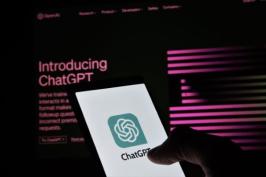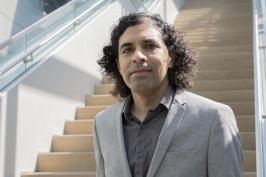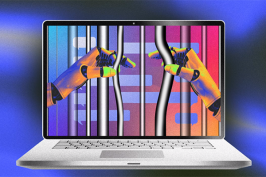Recent News

Nature.com: How to stop AI deepfakes from sinking society — and science
Deceptive videos and images created using generative AI could sway elections, crash stock markets and ruin reputations. Researchers are developing methods to limit their harm.
In this article from Nature.com, CSRAI director Shyam Sundar speaks on how to harness the powers of generative AI for good, while developing tools to guard against the bad.
Center for Socially Responsible AI invites seed funding proposals
The Center for Socially Responsible Artificial Intelligence invites short proposals for its annual seed funding program. Penn State faculty are can submit proposals for research that advance the center's mission of promoting, practicing and studying socially responsible ways of using, building and deploying AI technology.

College of Information Sciences and Technology welcomes nine new faculty members
The Penn State College of Information Sciences and Technology has welcomed nine new faculty members in 2023. The two tenure-line members and seven non-tenure-line members represent the college’s four research areas: data sciences and artificial intelligence, human-computer interaction, privacy and security, and social and organizational informatics.

WPSU: Penn State Professor Shyam Sundar on the use of AI tools in education
CSRAI Director S. Shyam Sundar shares his perspective with WPSU on the benefits and challenges of using AI tools in education.

Psychology Today: Chatbots Are a Valuable Tool—and a Moral Test for Us All
Originally written by CSRAI Affiliate Patrick Plaisance for Psychology Today.
"Generative AI” tools promise to provide us with many good things, but they also provide us with something else: a moral test of sorts.
We may well be on our way to failing the moral test posed by chatbots by ignoring the lessons of our response to the burgeoning dominance of social media that began 20 years ago.

New York Times: How Easy Is It to Fool A.I.-Detection Tools?
CSRAI Director S. Shyam Sundar shares his perspective in the New York Times on the fast-burgeoning crop of companies that are offering services to detect AI-generated images to help society separate fact from fiction.

Center for Socially Responsible AI awards Big Ideas Grants to five projects
The Penn State Center for Socially Responsible Artificial Intelligence awarded more than $212,000 to advance five interdisciplinary research projects as part of its Big Ideas Grant program. Awarded projects feature researchers from six departments across four colleges and institutes.

Transparent labeling of training data may boost trust in artificial intelligence
Showing users that visual data fed into artificial intelligence (AI) systems was labeled correctly might make people trust AI more, according to researchers. The findings may also pave the way to help scientists better measure the connection between labeling credibility, AI performance and trust.

IST assistant professor Shomir Wilson receives NSF CAREER Award
Shomir Wilson, assistant professor in the Penn State College of Information Sciences and Technology, is the recipient of a Faculty Early Career Development (CAREER) award from the National Science Foundation in recognition of his work, “Large-Scale Exploration and Interpretation of Consumer-Oriented Legal Documents.”

What is ChatGPT and what can it be used for?
Penn State artificial intelligence experts offer perspectives on some of the most frequently asked questions.

Meet the Jailbreakers Hypnotizing ChatGPT Into Bomb-Building
If there’s one rule about rules, it’s that they’re bound to be broken. That goes for life, law, and, on a much more specific note, ChatGPT.
In fact, that rule may go doubly for ChatGPT. As the chatbot’s popularity has ballooned, so too has the uncontrollable urge to make OpenAI’s language model do things it shouldn’t — for example, telling you step-by-step how to build explosives.
In this story from Inverse, CSRAI director S. Shyam Sundar offers his perspective on who is responsible for ensuring a safe experience on ChatGPT.
Regulating AI: 3 experts explain why it’s difficult to do and important to get right
Given the potential for widespread harm as technology companies roll out new AI systems and test them on the public, policymakers are faced with the task of determining whether and how to regulate the emerging technology. The Conversation asked three experts on technology policy to explain why regulating AI is such a challenge – and why it’s so important to get it right.

Center now offering social responsibility consultations for AI researchers
Penn State’s Center for Socially Responsible Artificial Intelligence is now offering social responsibility consultations to University researchers engaged in AI-related research.

Center issues seed grant call for 'Big Ideas' in socially responsible AI
Penn State’s Center for Socially Responsible Artificial Intelligence is inviting short proposals for a special off-cycle round of "Big Idea Grant" seed funding earmarked for early concepts and research that has transformational potential. Applications will be accepted through May 1, with projects expected to start on July 1 and last for up to two years.

CSRAI sponsoring workshop on AI for Social Good at AAAI Conference
The Center for Socially Responsible Artificial Intelligence (CSRAI) at Penn State is pleased to announce that it is sponsoring the International Workshop on AI for Social Good on February 14, 2023, during the prestigious AAAI Conference on Artificial Intelligence in Washington D.C.
